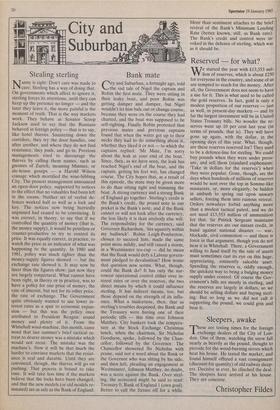City and Suburban
Stealing sterling Manny is right: Don't care was made to 1 111 care. Sterling has a way of doing that. On governments which affect to ignore it, sterling forces its attentions, until they can keep up the pretence no longer — and the later they leave it, the more painful is the moment of truth. That is the way markets work. They behave as Senator Scoop Jackson used to say that the Russians behaved in foreign policy — that is to say, like hotel thieves. Sauntering down the corridors, they try the door handles, one after another, and where they do not find resistance, they push, and go in. Previous managements tried to discourage the thieves by calling them names, such as gnomes of Zurich, moaning Minnies, or ale-house gossips — a Harold Wilson coinage which mortified the wine-bibbing City. The present management announced an open-door policy, supported by notices to the effect that no valuables had been left in the rooms. Neither set of verbal de- fences worked half so well as a lock and key. The notices now being hurriedly unpinned had ceased to be convincing. It was correct, in theory, to say that if we controlled the quantity of money (that is, the money supply), it would be pointless or counter-productive to try to control its price. It was equally correct, in practice, to watch the price as an indicator of what was happening to the quantity. In 1980 and 1981, policy was much tighter than the money-supply figures showed — but the exchange rate showed it. It may now be laxer than the figures show: just now they are largely conjectural. What cannot have been right, in theory or in practice, was to have a policy for one price of money, the rate of interest, but not for its other price, the rate of exchange. The Government quite obviously wanted to use lower in- terest rates as a spur to economic expan- sion — but this was the policy once attributed to President Reagan: sound money and plenty of it. From the Whitehall wind-machine, this month, came word that last summer's brief tactical re- treat to dearer money was a mistake which would not recur. The mistake was the machine's. Now it will be that much the harder to convince markets that the resist- ance is real and durable. Until they are convinced, though, the thieves will go on pushing. That process is bound to take time. It will take less time if the markets believe that the locks have been changed, and that the new models (or old models re- instated) are as safe as the Bank of England.










































 Previous page
Previous page